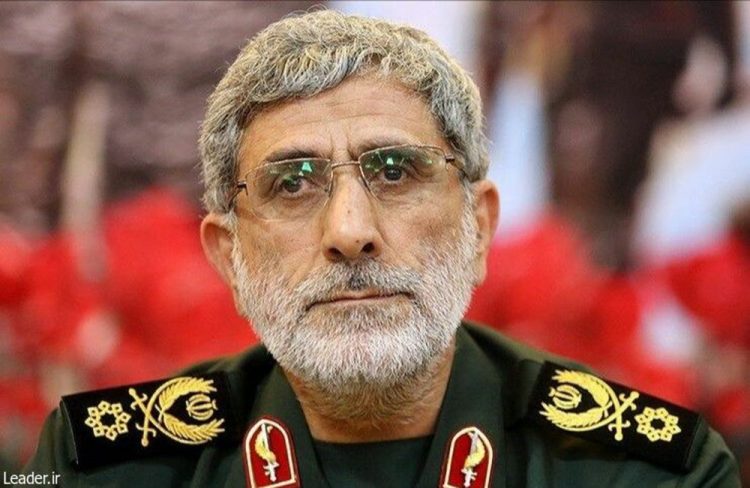ISTANBUL — Just hours after a U.S. drone strike killed Iran’s charismatic elite Quds Force commander in Baghdad early Friday, Tehran announced it had named a successor: the force’s little-known deputy chief, Brig. Gen. Esmail Ghaani.
Ghaani, 62, was appointed by supreme leader Ali Khamenei, who issued a statement praising the general’s role as a prominent commander in the Islamic Revolutionary Guard Corps. As a key branch of the Revolutionary Guard, the country’s most powerful security organ, the Quds Force carries out the Iranian military’s special operations abroad.
Ghaani’s predecessor, Maj. Gen. Qassem Soleimani, was a larger-than-life figure and deft architect of Iran’s success in building loyal proxy forces in the Middle East. It is a network that Tehran used to help defeat the Islamic State and to project military and political power in places such as Lebanon, Iraq, Syria and Yemen.
But the bespectacled Ghaani – whose portfolio as deputy included Quds Force operations in Afghanistan, Pakistan and Central Asian republics – boasts few notable military victories. Instead, experts say, he is believed to have focused on the organization’s day-to-day administrative affairs.
“Ghaani’s war-era record does not display the same degree of distinction as Soleimani’s,” said Ali Alfoneh, a senior fellow at the Arab Gulf States Institute in Washington and author of “Iran Unveiled: How the Revolutionary Guards are Transforming Iran from Theocracy Into Military Dictatorship.”
Arash Azizi, a New York-based writer who is researching a forthcoming book on Iran’s external military operations, said: “Ghaani was presumed to be the heir apparent for a long time. But he’s very bureaucratic – he does not have Soleimani’s charisma.”
“As someone who works in Iran’s national security apparatus, he hasn’t really distinguished himself,” Azizi said.
What the obscure new commander brings, however, is continuity in the face of an extraordinary blow to the Quds Force’s leadership, analysts say. As deputy commander, a position he assumed in the late 1990s or early 2000s, according to reports, he possesses intimate knowledge of the force’s inner workings and covert activities.
“Under Ghaani’s leadership, there is likely to be greater continuity than change in the Quds Force,” said Alfoneh.
“I suspect he’ll have little difficulty filling Soleimani’s shoes when it comes to operations and strategy,” said Afshon Ostovar, author of “Vanguard of the Imam: Religion, Politics, and Iran’s Revolutionary Guards.”
Ghaani first joined the Revolutionary Guard as a young man in 1980, when it was a nascent force tasked with protecting the Islamic Republic. He soon became division commander, leading battles in the Iran-Iraq war in the 1980s, and oversaw operations in northeastern Iran, where he was born.
There, according to Alfoneh, Ghaani likely helped facilitate support for Afghanistan’s Northern Alliance, a group of fighters that sought to overthrow the Taliban, a Sunni militant movement that came to power in 1996.
In 1998, when Taliban forces attacked Iran’s consulate in the northern Afghan city of Mazar-e Sharif, killing nine diplomats, Ghaani was instrumental in dissuading Tehran’s leadership from responding militarily, Azizi said.
“Many people were eager for Iran to take action,” Azizi said. “It was an act of maturity on Ghaani’s part in deciding not do anything rash.”
Ghaani and his predecessor appear to have divided the labor: Soleimani operated on Iran’s western front, while Ghaani’s focus remained on its eastern borders.
Ghaani also once traveled with Iran’s then-president, Mahmoud Ahmadinejad, to several countries in Africa and South America. In 2012, the Treasury Department sanctioned Ghaani for overseeing the distribution of the Quds Force’s finances to regional allies. He was also responsible for a weapons shipment to Gambia that was intercepted in Nigeria in 2010, the department said.
He is also believed to have to have played a prominent role in establishing Liwa al-Fatemiyoun, a military brigade of mostly Afghan Shiite Hazaras who were deployed to Syria to assist government forces.
In 2012, Ghaani was the first Revolutionary Guard commander to publicly acknowledge Iran’s military presence in Syria, telling an Iranian news outlet that due to Iran’s involvement in the war, “big massacres were prevented.”
“Ghaani seems to be a more cagey personality than his predecessor. But like Soleimani, Ghaani seems to have a strong personal relationship with the supreme leader,” said Ostovar.
His decades-long career at the highest levels of the Revolutionary Guard “says a lot about the trust both Khamenei and Soleimani had in him,” he said.
Still, experts say, Ghaani lacks broader experience in the Arab world, an area crucial to Iran’s efforts to counter U.S. and Israeli military power.
“I don’t think that he speaks Arabic, and he doesn’t have the same understanding of the Arab world or of Israel that Soleimani had,” said Azizi.
According to Ostovar, “it’s unlikely that Ghaani’s friendships with proxy commanders are as well developed or run as deep as Soleimani’s.”
As a result, he will “probably run operations primarily from a distance,” Ostovar said. “Even if he wanted to replicate Soleimani’s general-on-the-frontlines photo ops, it’ll be difficult for him to do now.”
Send questions/comments to the editors.



Success. Please wait for the page to reload. If the page does not reload within 5 seconds, please refresh the page.
Enter your email and password to access comments.
Hi, to comment on stories you must . This profile is in addition to your subscription and website login.
Already have a commenting profile? .
Invalid username/password.
Please check your email to confirm and complete your registration.
Only subscribers are eligible to post comments. Please subscribe or login first for digital access. Here’s why.
Use the form below to reset your password. When you've submitted your account email, we will send an email with a reset code.